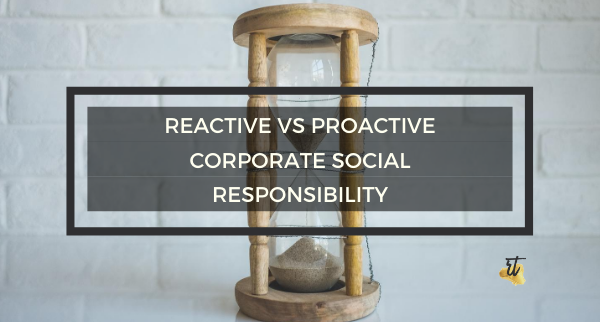The Costs & Benefits
We can all agree being proactive vs reactive is always the best position to be in. Being on the offense vs the defense always produces better outcomes, but what does that look like when it comes to something like Corporate Social Responsibility? Today, that’s what I’m going to break down. The costs of being reactive when it comes to Corporate Social Responsibility vs the benefits of being proactive.
First, let’s make sure we really understand the difference between proactive vs reactive. Being proactive is responding to issues or events before they happen, planning ahead, controlling the situation, and creating the ultimate outcome.
Reactive is just the opposite. It’s responding to issues or events after they’ve happened. It’s getting caught in what’s already happening, not having control, or being limited in having control of the outcome. It’s often something that catches you off guard, typically having “bad” timing.
When it comes to corporate accountability and responsibility, being proactive and reactive takes on an even deeper meaning and the costs and benefits are polar opposite. Let’s take a look at a few examples of the costs related to being reactive and the benefits related to being proactive in Corporate Social Responsibility.
The Costs of Reactive Corporate Social Responsibility:
Company’s Reputation at Risk:
Often, when you’re reacting to negative events related to a lack of Corporate Social Responsibility within your organization, you’re putting out fires. When you’re putting out fires, whether it’s about your business practices or ethical issues within your leadership, your company’s reputation typically takes a huge negative hit. You’re often the target of criticism for how your company’s been operating and, in today’s age, you’re in danger of being canceled out by Cancel Culture.
Working from this position to salvage your company’s reputation, trying to get on the good side of society and your consumers can be incredibly difficult and often leads to “Hail Mary” strategies by panicking leadership teams.
These “Hail Mary” strategies are typically not the best because there’s limited thought put into the strategies themselves. I consider these short-sighted strategies because you’re so caught up in the defense that you can easily miss the response needed that got you here in the first place.
Economic Instability
An obvious and ultimate byproduct of a poor company reputation due to a lack of proactive Corporate Social Responsibility is economic instability. Let’s face it, you’re in business and to survive let alone thrive, businesses need to make money. But what happens when your company’s reputation is tarnished, to say the least, because your manufacturers aren’t treating their employees humanely, you’re saying you’re a green brand but you’re more like greenwashing, or your company is now making headlines for sexual misconduct allegations? You start to lose brand loyalty from those that help you stay in business. And, with all of us having immediate access to the ultimate communication infrastructure – social media, people spread the word, big bird. All of a sudden your company’s name is associated with #boycott.
Depending on how big the reaction, you could lose profits on a slow drip or it could be immediate and all hell breaks loose.
Goodbye Partnerships
Another detrimental byproduct of reactive Corporate Social Responsibility is the potential loss of your key stakeholders or partnerships. We all know collaboration is key to running a successful business. For your organization, that might mean distributors, service providers, or even celebrity affiliations just to name a few. What I can tell you about partnerships is, most partners steer clear of controversy as soon as it starts because everyone knows bad press is bad for business. Now, I know “press is press” and “there’s no such thing as bad press”, but in today’s social climate, things have shifted. No one’s willing to put their reputation on the chopping block for a little bit of press because negative press today comes with a whole ‘lotta mess. So, if you’re the one facing backlash for poor corporate accountability or responsibility, trust me, no one’s willing to weather the storm with you.
So, when you find yourself in the unfortunate circumstance of reactive Corporate Social Responsibility, you’re typically finding yourself scrambling to explain yourself, trying to salvage your partnerships. What a messy and highly stressful situation to find yourself in.
Now, let’s review the polar opposite of reactive Corporate Social Responsibility. Proactive Corporate Social Responsibility is a powerful corporate strategy if I’ve seen one! It harnesses good business practices with smart business. Instead of being vulnerable as a company, your leadership team understands the value of positioning themselves on the offensive. Let’s take a look at some of the benefits.
The Benefits of Proactive Corporate Social Responsibility:
Sincerer Leadership
Nothing spells out sincere leadership more than proactive Corporate Social Responsibility and in today’s social climate, sincere leadership speaks volumes! Being proactive about your business practices and incorporating Corporate Social Responsibility into your business before the headlines get you means you are a Conscious Leader. 2020’s consumers love nothing more than a Conscious Business Leader. This creates tremendous brand awareness and loyalty because the audience sees you as authentic, someone who cares about social concerns, and you’re a leader who’s willing to put your money where your mouth is or, is willing to do the work necessary to achieve positive impact. You understand the concerns of your consumers and you’re willing to do what’s necessary to do good by them, the planet, and your business.
When you find yourself at this level of sincere leadership, brand loyalty is at an ultimate high. Your consumers go from buyers to die-hard fans to sharing your brand with everyone they know. They do the marketing for you because they feel like you deserve it, and because you do the hard work of Corporate Social Responsibility, they feel like more people should invest in you as a brand. Do you see the snowball effect?
Innovation Galore
Being on the offensive vs the defensive with your Corporate Social Responsibility means you’re never finding yourself behind the eight ball. What does that mean? That means you’re clear to create. You and your team are in an innovative state, free from the stress of the mess. You’ll find yourself feeling good about your company, your team feels dedicated to your company values and mission, and collectively, there’s an air of creativity because everyone’s feeling good about the company and what type of impact they’re making.
Additionally, when you’re in a proactive mode, your Corporate Social Responsibility initiatives have the opportunity to spur new product or service ideas. Whether that looks like a solution that comes out of one of your initiatives or whether that’s reacting with a solution to a real-time social issue because you’ve been in a proactive and innovative state.
Thought Leadership
What would you give to be a Thought Leader amongst your peers or within your industry? Take a moment to really consider what that could look like for you, your company, and your 5, 10, or even 20-year goals. Let me quickly summarize it: Huge Success!
When you’re proactively looking to establish Corporate Social Responsibility within your company and, subsequently, in your industry, you start to stand out. All of a sudden, everyone wants to know your secret sauce. How did you come up with that initiative, why are you doing it, what benefits does it have for your business? Moreover, the big underlying question is, why aren’t we doing this?
First comes the attention then comes the press. And when you become a Thought Leader in your industry, you open up portals of opportunity that you could have never imagined. You’re the go-to for advice, expertise, and industry-leading standards. You are the one partners want to collaborate with, and your reputation, well, it’s glorious!
Now, although I haven’t broken down all the costs and benefits of reactive vs proactive Corporate Social Responsibility, I’m certain I’ve given you some food for thought. I want you to chew on some of the costs that come from reactive Corporate Social Responsibility and consider some of the benefits of being proactive:
Can your company sustain the damaging effects of social backlash for being a poor corporate citizen?
Or, can you see how your company can thrive by incorporating Corporate Social Responsibility as part of your business model before anyone even sings your praises?
As I’ve said in many of my articles before, Corporate Social Responsibility is here to stay. It is the new way of doing business. Don’t get caught behind the eight ball, be proactive about your corporate citizenship so you can continue to thrive in business.
Are you ready to create massive impact and a huge buzz with your Corporate Social Responsibility? Book a consultation with me so we can narrow in on who you are as a company, your industry, and the best possible initiatives you can take in the now to create the impact that’ll be your legacy.

